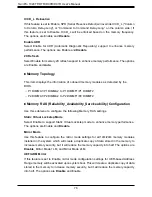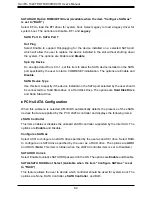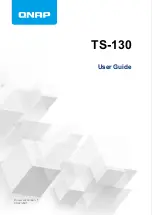
Chapter 4: BIOS
79
IOAT Configuration
Disable TPH (TLP Processing Hint)
TPH is used for data-tagging with a destination ID and a few important attributes. It can
send critical data to a particular cache without writing through to memory. Select No in this
item for TLP Processing Hint support, which will allow a "TPL request" to provide "hints"
to help optimize the processing of each transaction occurred in the target memory space.
The options are Yes and
No
.
Prioritize TPH (TLP Processing Hint)
Select Yes to prioritize the TPL requests that will allow the "hints" to be sent to help facilitate
and optimize the processing of certain transactions in the system memory. The options are
Enable and
Disable
.
Relaxed Ordering
Select Enable to enable Relaxed Ordering support which will allow certain transactions to
violate the strict-ordering rules of PCI and to be completed prior to other transactions that
have already been enqueued. The options are
Disable
and Enable.
Intel® VT for Directed I/O (VT-d)
Intel® VT for Directed I/O (VT-d)
Select Enable to use Intel Virtualization Technology support for Direct I/O VT-d by reporting
the I/O device assignments to the VMM (Virtual Machine Monitor) through the DMAR
ACPI tables. This feature offers fully-protected I/O resource sharing across Intel platforms,
providing greater reliability, security and availability in networking and data-sharing. The
options are
Enable
and Disable.
Interrupt Remapping
Select Enable for Interrupt Remapping support to enhance system performance. The
options are
Enable
and Disable.
PassThrough DMA
Select Enable for the Non-Iscoh VT-d engine to pass through DMA (Direct Memory Access)
to enhance system performance. The options are
Enable
and Disable.
ATS
Select Enable to enable ATS (Address Translation Services) support for the Non-Iscoh VT-d
engine to enhance system performance. The options are
Enable
and Disable.
















































